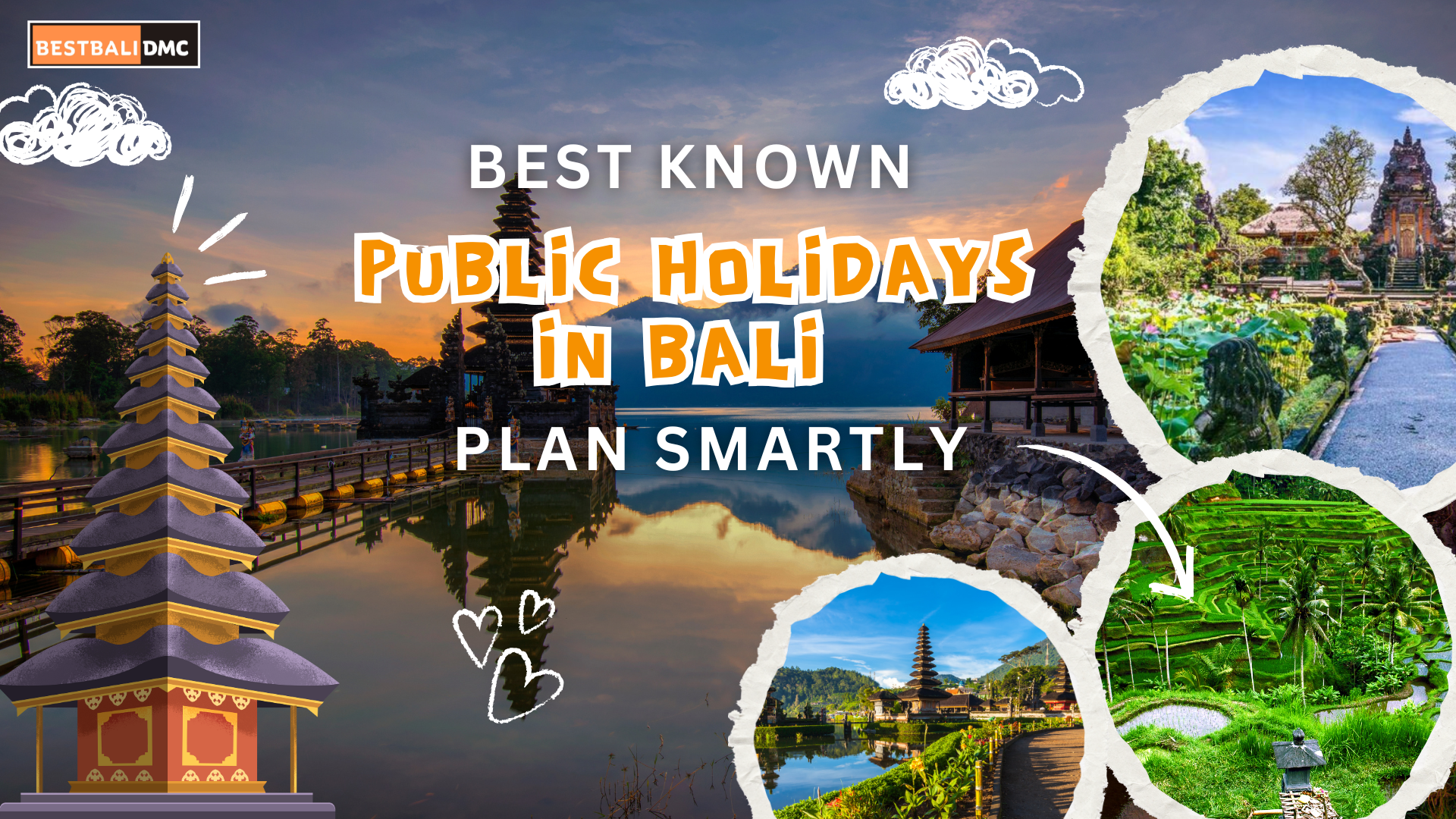Bali Public Holidays: Essential Information for Indian Travel Agents Planning Bali Packages

When planning a Bali tour package, especially for Indian travelers, it’s vital to consider Bali’s public holidays and their implications. Being aware of these dates can help ensure a seamless experience, as several of these holidays involve public closures, grand processions, and local festivities that impact daily life in Bali. As Best Bali DMC, a B2B Bali DMC specialist, we aim to equip Indian travel agents with essential insights, helping them prepare Bali packages that meet travelers’ expectations while allowing them to experience the island’s unique cultural events.
Here’s a comprehensive guide to Bali’s key public holidays, including important dates, observances, and how they may impact travel itineraries:
1. Nyepi Day (Day of Silence)
- Date: Celebrated on the Balinese New Year (usually in March).
- Observance: Nyepi is one of Bali’s most significant cultural events. It marks the start of the Balinese Saka New Year, and the entire island essentially “shuts down.” Airports, ports, roads, and even beaches are closed for 24 hours. All shops and businesses, including banks and government offices, are shut.
- What Happens: Nyepi is observed with absolute silence, introspection, and reflection. Tourists are required to stay within their hotels and minimize noise and activity out of respect for local traditions. Travel agents should inform their clients that they won’t be able to leave their hotels, as outdoor activities are restricted. Although Nyepi is a quiet holiday, it offers a unique glimpse into Balinese culture. The day before Nyepi, processions and rituals, like the Ogoh-Ogoh parade, take place as locals carry giant effigies through the streets.
2. Galungan and Kuningan
- Dates: Galungan occurs every 210 days (following the Balinese Pawukon calendar), with Kuningan held ten days after.
- Observance: These holidays celebrate the victory of good (dharma) over evil (adharma). During this period, Balinese people honor their ancestors by decorating temples and creating tall, elaborately decorated bamboo poles called penjor. The festive atmosphere is marked by traditional attire, ceremonies, and offerings.
- Impact on Tourism: While most tourist areas remain open, some locals may not be available for regular services due to their involvement in religious ceremonies. Indian travelers can experience Bali’s religious richness during these days, as many temples conduct special prayers and rituals.
3. Hari Raya Idul Fitri (End of Ramadan)
- Dates: This holiday shifts each year based on the Islamic lunar calendar.
- Observance: Hari Raya Idul Fitri is a significant Islamic holiday marking the end of Ramadan. While the Hindu population dominates Bali, there are many Muslims on the island who observe this holiday.
- What Happens: Some public services and local businesses may close, as many people travel home to celebrate with their families. Airports may experience a surge in domestic travel, potentially leading to crowded conditions and delays. While this holiday doesn’t have a direct cultural impact on tourist activities, travel agents should advise clients to expect increased crowds at airports.
4. Hari Raya Saraswati
- Date: This holiday occurs every 210 days, according to the Pawukon calendar, typically falling on a Saturday.
- Observance: Dedicated to Saraswati, the Hindu goddess of knowledge, Hari Raya Saraswati is celebrated primarily within educational institutions and temples.
- Impact on Tourism: While not directly impacting most tourist services, temples, schools, and universities often hold ceremonies. It provides an excellent opportunity for travelers to witness Balinese devotion and prayer. Agents can include temple visits in the itinerary for a more cultural experience on this day.
5. Independence Day of Indonesia
- Date: August 17th
- Observance: Independence Day commemorates Indonesia’s declaration of independence from Dutch colonial rule in 1945. The entire nation, including Bali, celebrates this day with flag-raising ceremonies, parades, and various traditional games.
- What Happens: Most businesses, including shops and tourist attractions, remain open. However, the day is marked by lively parades and events. Many streets are decorated, and travelers can join in the celebrations, experiencing the local sense of national pride. Some attractions may be busier than usual, making it advisable to book tours and accommodations in advance.
6. Pagerwesi (Day of Strengthening)
- Date: Celebrated every 210 days (in the Balinese calendar), usually on a Wednesday.
- Observance: This holiday is dedicated to spiritual strengthening and protecting oneself against evil forces.
- Impact on Tourism: On Pagerwesi, many locals will spend time in prayer and temple offerings, and the streets are decorated with penjor. Shops and services usually remain open. However, agents should consider adding temple visits to their clients’ itineraries, as the temples are especially beautiful on this day.
7. Christmas and New Year’s Celebrations
- Dates: December 25th (Christmas) and January 1st (New Year’s Day)
- Observance: Although the majority of Balinese are Hindu, Christmas is celebrated by the Christian community on the island, and New Year’s Eve is a popular celebration for both locals and tourists.
- What Happens: Most hotels, restaurants, and beach clubs hold special events, parties, and fireworks for New Year’s Eve, making it one of the busiest times on the island. Travel agents should inform clients about potential price hikes for accommodations and the need for early bookings.
Planning Tips for Indian Travel Agents
1. Coordinate Itineraries Around Holidays
Certain holidays, like Nyepi, require special attention due to the full shutdown of public spaces, including beaches and airports. Advise clients to stay within hotels during this period, but highlight the unique cultural significance of this day.
2. Book Services in Advance During Busy Periods
During festivals like Galungan and Kuningan or New Year’s Eve, it’s wise to book transportation, accommodations, and popular tourist attractions well in advance. This helps avoid last-minute price surges and ensures smooth travel.
3. Encourage Cultural Exploration
Bali’s holidays provide excellent opportunities for travelers to immerse themselves in local culture. Including temple tours or participation in local festivities, where allowed, can enhance their travel experience.
4. Inform Clients of Potential Service Interruptions
For holidays like Idul Fitri, where local travel peaks, agents should communicate possible airport congestion and encourage early arrival for flights. Similarly, certain services may be temporarily unavailable during major Hindu ceremonies.
5. Collaborate with a Reliable DMC
Partnering with a trusted B2B Bali DMC like Best Bali DMC can help you handle logistics smoothly, especially during holiday seasons. A local DMC can manage reservations, provide holiday insights, and offer alternative experiences if certain attractions are closed.
Conclusion
By understanding Bali’s public holidays, Indian travel agents can design Bali tour packages that anticipate potential disruptions while allowing travelers to experience Bali’s vibrant culture. The support of a B2B Bali DMC can be invaluable in managing logistics and crafting memorable experiences around these holidays. Best Bali DMC is here to support your needs as you plan and execute successful Bali tours that cater to Indian travelers seeking both relaxation and cultural exploration.
For seamless holiday planning and to create an unforgettable experience for travelers, Best Bali DMC offers professional, on-ground support in handling holiday schedules, ensuring tourists can enjoy the best of Bali year-round.

Can we help you?
